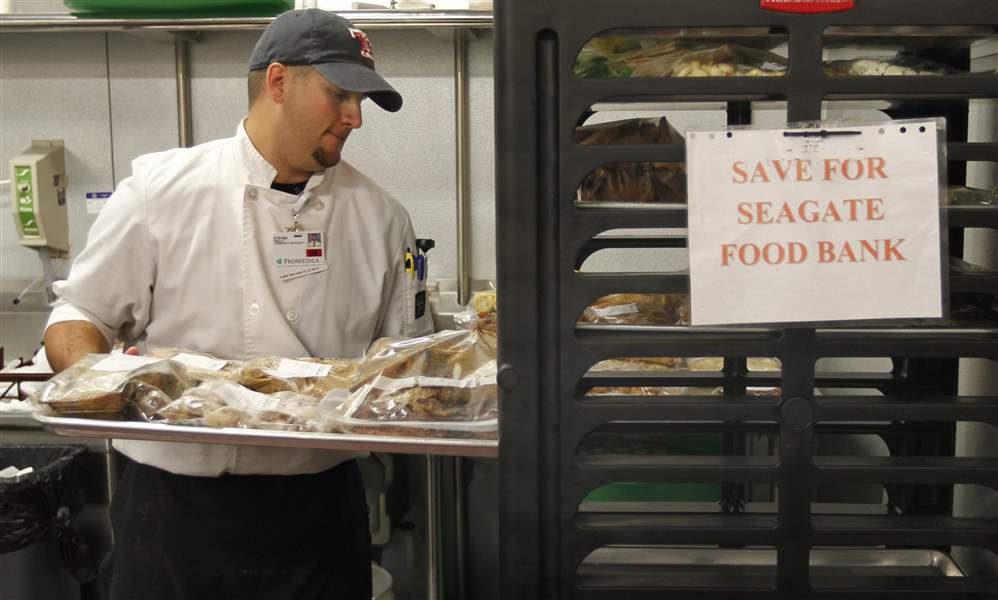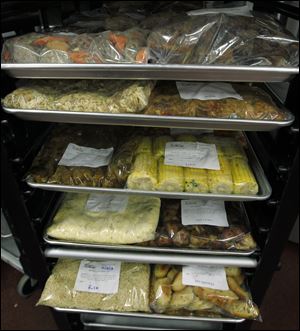
ProMedica combating hunger
Hospital chain redirects food to needy, aims to enlist allies
10/7/2013
Steven Findlay of Promedica packages unused food at Hollywood Casino Toledo that is sent to the Seagate Food Bank. Better nutri-tion can reduce hospitalizations, ProMedica says.
The Blade/Lori King
Buy This Image

Steven Findlay of Promedica packages unused food at Hollywood Casino Toledo that is sent to the Seagate Food Bank. Better nutri-tion can reduce hospitalizations, ProMedica says.
Businesses usually want people streaming through their doors but ProMedica — one of Toledo’s largest employers — is actually looking for ways to keep people out of its hospitals.
Chief Executive Officer Randy Oostra admits its counter-intuitive to what the health-care industry has thought for a generation.
“This is a journey we have been on for a couple of years — about four or five years when we started preparing for changes to the health-care industry,” Mr. Oostra said.
The reality for many patients, Mr. Oostra said, is that their trips to hospitals could have been prevented. ProMedica has joined forces with a national nonprofit agency in an attempt to prevent two contributing factors: hunger and malnutrition.
Part of its mission to end hunger and malnutrition brought ProMedica to Hollywood Casino Toledo, where two part-time ProMedica employees package food that would otherwise be discarded.
The initiative has been eye-opening, Mr. Oostra said.
Since February, ProMedica has saved more than 30,000 pounds of food that was prepared but never served.
“Now you have food that is not going to the dump,” said Barbara Petee, ProMedica’s chief advocacy and government relations officer. “There is a much greater need the last couple of years for food assistance.”
That food instead gets shipped to Seagate Foodbank, which distributes it to low-income families and individuals.

Food reclaimed from the buffet of Hollywood Casino Toledo for the Seagate Food Bank. It was prepared but never served.
Another surprise came from children at Toledo’s McKinley Elementary School — ProMedica’s adopted school, where it would bring fresh fruits and vegetables.
“One child was trying to peel off the brown paper that was on his potato... He didn't know it was the skin,” Mr. Oostra said. “He had never seen a baked potato before.”
To address hunger as a health issue, ProMedica partnered with the Alliance to End Hunger in Washington. The two groups had scheduled an Oct. 10 half-day summit in Washington on the topic, but now plan to hold the event early next year because of the federal government shutdown.
The Come to the Table Summit will include speeches by Audrey Rowe, administrator for the Food and Nutrition Service, U.S. Department of Agriculture; Ravi Sachdev, managing director of JP Morgan; Ken Thorpe, chairman of the Partnership to Fight Chronic Disease; Dr. Deborah Frank, founder of Children’s Health Watch, and Ellie Hollander, chief executive officer of the Meals on Wheels Association of America.
The purpose is to encourage other health-care organizations to address hunger as a health issue and federal legislators to protect food-related programs and policies.
Tony Hall, executive director of the Alliance to End Hunger, said he was elated to join forces with ProMedica and that he supports its mission to make hunger as a health issue a national priority among health-care providers.
“Health-care systems are starting to see an abundance of people who are malnourished and have improper nutrition,” Mr. Hall said. “What is interesting about ProMedica is they are really a leader in this area in the country and it is really encouraging for me.”
Some of the means to prevent Americans from starving include food banks, food pantries, vouchers, subsidized meals, school and summer meal programs, soup kitchens, and the Supplemental Nutrition Assistance Program, also known as food stamps.
Mr. Oostra said healthy options are not affordable on food stamps alone.
In Toledo, ProMedica matches food stamp benefits at the Toledo Farmer’s Market. People who receive the benefit can get double the amount of fresh produce.
Also, ProMedica Bixby Hospital and the Lenawee County Health Network have launched a “Veggie Mobile,” which delivers affordable fresh produce at stops throughout the county. Basically, the hospital operator wants other health-care systems to consider what happens for people at mealtime outside hospitals’ walls and how food insecurity affects patients’ health.
A study by ProMedica and the Partnership to Fight Chronic Disease found that nearly one in five Lucas County residents — more than 85,000 people — face hunger. That’s one of the highest rates statewide, Mr. Oostra said.
Contact Ignazio Messina at: imessina@theblade.com, 419-724-6171, or on Twitter @IgnazioMessina.